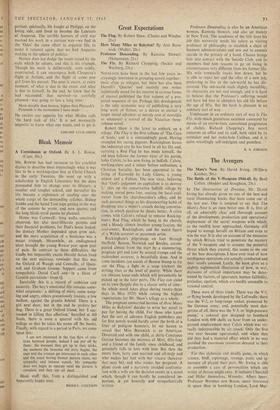Bleak Memoir
A Cornishman at Oxford. By A. L. Rowse. (Cape, 30s.) MR. ROWSE has had recourse to his youthful diaries to describe most interestingly what it was like to be a working-class boy at Christ Church in the early Twenties. He went up with a scholarship in English Literature, but the dons persuaded him to change over to History, a manlier and tougher school, and thereafter his
life became a nightmare of reading over the whole range of the demanding syllabus. Bishop Stubbs and the hated Tout kept getting in the way of the sonnets he wrote, and now quotes, and the long blank-verse poems he planned.
Home was Cornwall: 'long walks sensitively observed, but also near-illiterate parents and their financial problems, for Dad's boots leaked, the donkey Mother depended upon grew sick, and the mere acquisition of a bookcase was a major triumph. Meanwhile, an undiagnosed ulcer brought the young Rowse year upon year of pain. In contrast to these difficulties, the kindly but impossibly exotic Harold Acton lived on the next staircase, reminder that this was the Oxford of Waugh and Connolly, of Quen- nell and Graham Greene. Support came from sympathetic David Cecil and—in a blaze of Cornish patriotism—from Q.
Inevitably this is a record of ambition and austerity. The boy's emotional life remains some- what enigmatic: a shifting of mists, some weep- ing and angry, others precariously roseate, a few mellow, against the granite behind. There is a girl next door, but in the end he prefers her dog. There is a great Oxford friend, but 'I suc- ceeded in killing that affection.' Installed at All Souls, there is even a quarrel with his old college so that he takes his name off the books. Finally, with regard to a period in Paris, we come upon this: I am not interested in the free flow of rela- tions between people, indeed I am put off by them: the moment they get up to their tricks, the moment the tiresome old story begins, the man and the woman get interested in each other and the usual boring human pattern starts, my sympathy and interest vanish. My sympathy does not begin to operate until the pattern is complete and they arc all dead. . . .
Bleak stuff,' this, from a distinguished apparently happy man. and
• PATRICK ANDERSON






























 Previous page
Previous page